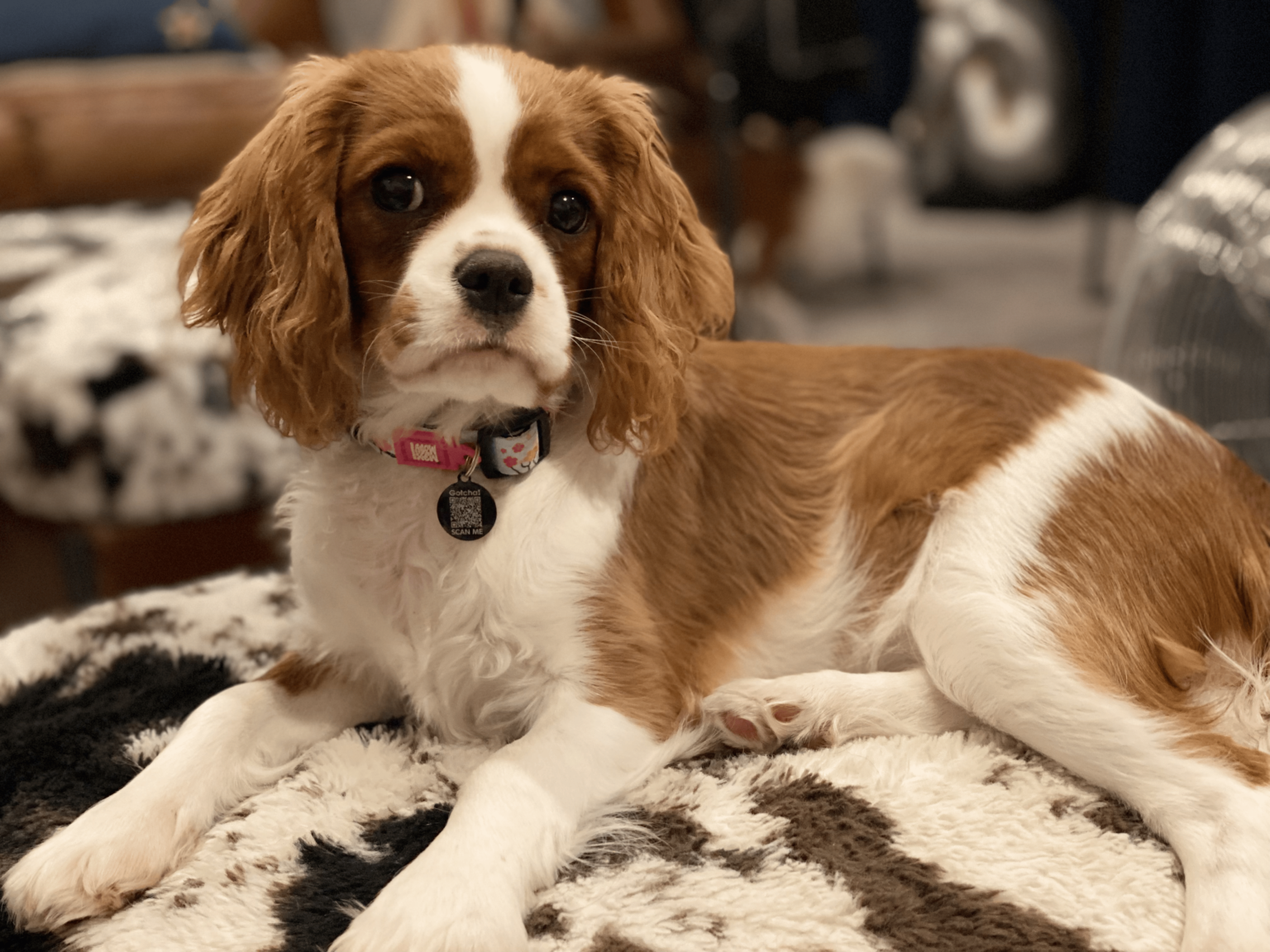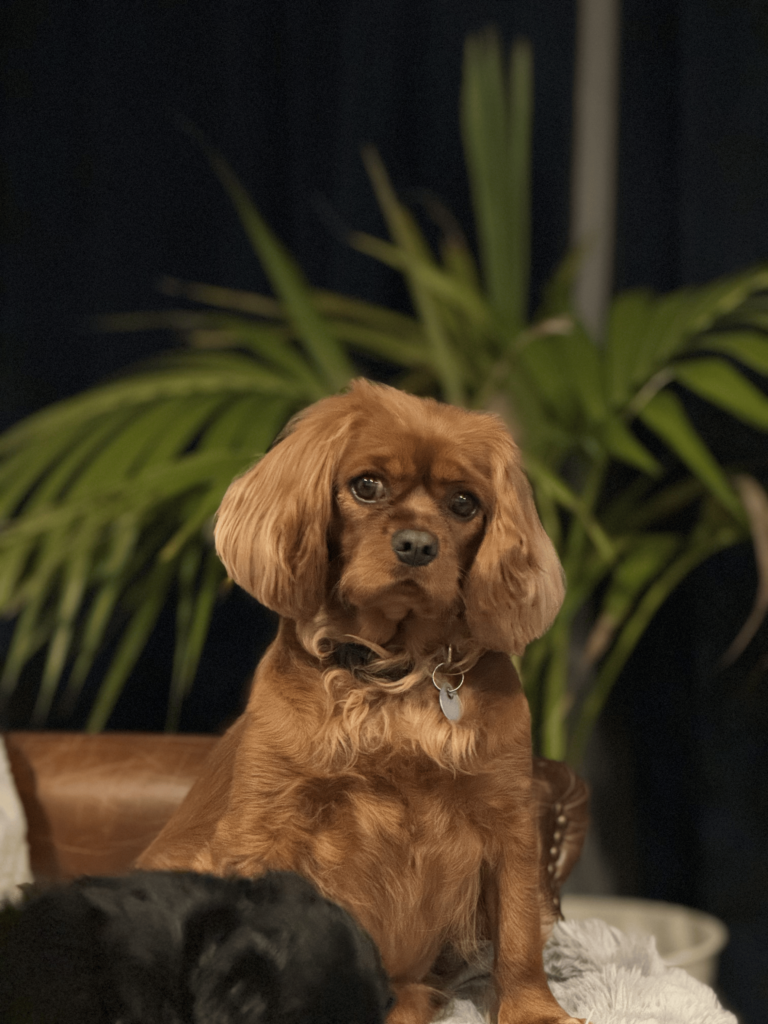About the Cavalier King Charles Spaniel
The Cavalier King Charles Spaniel has a rich history that dates back to the 16th century in England. Originally developed from small spaniel-type dogs popular among European nobility, they became particularly favoured by royalty. The breeds name comes from King Charles II of England, who was known for his love of these small, affectionate dogs. During the Restoration period, these spaniels were often depicted in paintings and tapestries with aristocratic families.
In the early 20th century, efforts to revive the original type of these spaniels were led by American Roswell Eldridge, who offered prizes for the best examples of the old-type spaniels at Crufts dog show. This initiative helped re-establish the breed we known today as the Cavalier King Charles Spaniel.
- Lifespan ( 9-14 Years )
- Height ( 12-13 Inches )
- Group ( Toy Group )

The colours of the Cavalier

Blenheim
Blenheim colour consists of two colours: chestnut and white.

Tricolour
The Tricolour consist of three colours: Black, tan and white. The amount of each colour can vary.

Black and Tan
Black and tan cavaliers were the apple of King Charles eye. He favoured Black and Tan coloured cavaliers over all other colour variations.

Ruby
Ruby cavaliers are meant to be solid chestnut ruby colour.
Why Choose a Cavalier King Charles Spaniel?
As a breeder, I can confidently say that the Cavalier King Charles Spaniel is one of the most versatile and loving breeds you could invite into your home. Here’s why they are an exceptional choice for various types of owners.
For those new to dog ownership
Cavaliers are known for their easy-to-train nature, making them perfect for new dog owners. Their eagerness to please and intelligence mean that even inexperienced trainers can manage and train them with ease. Their responsiveness to positive reinforcement and gentle methods ensure a smooth and enjoyable training process for both owner and dog.
For Families with Children
Cavaliers are incredibly patient and gentle, making them perfect for families, even those with young children. Your kids will find a loyal playmate who can keep up with their energy and provide endless cuddles.
For Single Individuals
If you’re single and looking for a faithful companion, look no further. Cavaliers are affectionate and love to be involved in your daily life. They’re social and friendly, providing excellent company, whether you’re relaxing at home or out on an adventure.
For Elderly Couples
Elderly couples will find Cavaliers to be the ideal companion. Their calm and loving demeanour, combined with their manageable size, makes them easy to handle. They enjoy being close to their owners, making them wonderful lap dogs that offer both companionship and emotional support.
The Perfect Homebody
Cavaliers are homebodies at heart. They thrive in environments where they can be close to their family members. They don’t do well being left alone for long periods, so they are perfect for owners who have the time to spend with them. Their social nature means they’ll quickly bond with other pets, grandchildren, or visitors
Final Thoughts
Choosing a Cavalier King Charles Spaniel means welcoming a loyal, affectionate, and well-behaved pet into your life. Whether you’re a family with kids, a single person seeking companionship, or an elderly couple looking for a gentle friend, Cavaliers bring love and joy to any home. Their adaptability and friendly nature ensure they’ll fit right into your lifestyle, offering unconditional love and companionship every step of the way.
Cavaliers as Therapy Dogs
Cavalier King Charles Spaniels are an excellent choice for therapy dogs for several reasons
1. Affectionate and Gentle Nature
Cavaliers are known for their loving and gentle disposition. They thrive on human companionship and are naturally inclined to provide comfort and affection, making them ideal for emotional support.
2. Calm and Patient Demeanour
Their calm and patient nature allows them to handle various environments and situations, from hospitals to care facilities, without becoming anxious or stressed. This makes them reliable companions in settings that may be chaotic or stressful for other breeds.
3. Adaptability
Cavaliers are adaptable and can easily fit into different routines and environments. Whether it’s a busy hospital or a quiet nursing home, they can adjust their behaviour to suit the needs of the people around them.
4. Intuitive and Empathetic
These dogs have an uncanny ability to sense the emotions of those around them. Their empathetic nature means they can provide comfort to individuals in distress, making them effective at offering emotional support.
5. Ease of Training
Cavaliers are eager to please and respond well to positive reinforcement training. Their intelligence and willingness to learn make them easy to train for specific tasks required of therapy dogs.
6. Small Size and Manageability
Their small size makes them easy to handle and transport, which is especially important in therapy settings where they might need to be carried or placed on a bed or lap. They can easily navigate tight spaces and are less intimidating to individuals who may be afraid of larger dogs.
6. Small Size and Manageability
Their small size makes them easy to handle and transport, which is especially important in therapy settings where they might need to be carried or placed on a bed or lap. They can easily navigate tight spaces and are less intimidating to individuals who may be afraid of larger dogs.
7. Friendly and Social Disposition
Cavaliers are naturally friendly and sociable, making them approachable and easy for people to interact with. Their pleasant demeanour helps build trust and rapport with those they are helping.
8. Minimal Grooming Needs
While Cavaliers do require regular grooming, their grooming needs are not overly demanding, making them manageable for handlers in therapy settings. In summary, the combination of their affectionate nature, calm demeanour, adaptability, and intelligence makes Cavalier King Charles Spaniels superb therapy dogs. They bring joy, comfort, and emotional support to those in need, fulfilling the essential role of a therapy animal.
9. Easy to Maintain
Cavalier King Charles Spaniels are remarkably easy to maintain due to their minimal grooming requirements. Their stunningly beautiful silky coats do not demand excessive grooming, making them a low-maintenance choice for pet owners. Regular brushing is typically sufficient to keep their coats in excellent condition, reducing the likelihood of matting and tangling. The only area that needs extra attention is between their paws, which should be kept short to prevent slipping on smooth surfaces.

